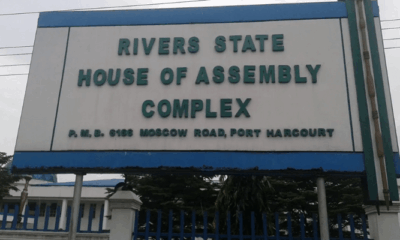Africa
Wike’s Backlash And The PR Lesson He Can’t Afford To Ignore -By Isaac Asabor
As Edward Bernays warned decades ago, “You can’t hide facts that are visible to everyone; you can only adjust perception through truth and empathy.” The public’s message is clear: Nigerians are uncomfortable with the image Wike is projecting. That discomfort, if not addressed, could define his political legacy more than any project he completes in Abuja.

In politics, especially in some parts of the world, perception is everything. No matter how powerful a politician may be, it is reputation, not position that ultimately determines longevity. This reality is now staring the Minister of the Federal Capital Territory, Nyesom Wike, in the face, as he battles intense backlash over his recent confrontation with a naval officer.
The uproar that followed the incident is not mere online outrage; it is a “public relations alarm bell”. The reactions from Nigerians, both on social and traditional media, expose how the public currently perceives Wike. As Edward Bernays, the father of modern PR, once observed, “Public relations are the attempt, by information, persuasion, and adjustment, to engineer public support for an activity, cause, or institution.” When that “engineering” collapses, backlash becomes inevitable, and that backlash becomes the clearest reflection of public sentiment.
For a man long regarded as bold and fearless, this backlash signals a shift. Nigerians are not just reacting to the video, they are responding to what it represents: “a growing perception of arrogance and abuse of power.”
According to Grunig and Hunt’s Two-Way Symmetrical Model of Public Relations, effective communication requires dialogue and understanding between leaders and the public. When that balance breaks, trust erodes. Wike’s combative style, which once projected confidence, now reads as confrontation, and the backlash is the public’s way of recalibrating that relationship.
In PR, perception outweighs authority. Power can be conferred, but credibility must be earned. Harold Burson, co-founder of Burson-Marsteller, said it best: “Public relations is not what you say, but what others hear, and more importantly, what they believe.”
What Nigerians saw in that viral video was not leadership, it was confrontation. In a country weary of political excesses, that image is damaging. The harsh criticism now trailing Wike reveals that his public goodwill has waned. His “strongman” persona, once interpreted as courage, now risks being seen as arrogance.
Reputation management is not a reactive exercise, it is a continuous process. As Al and Laura Ries wrote in ‘The 22 Immutable Laws of Branding’, “Public relations builds brands; advertising maintains them.” Against the backdrop of the foregoing professional fact in PR, it is expedient to opine that Wike’s brand now requires rebuilding.
A good start would be “acknowledgment” of the fact that his public conduct is increasingly becoming unappealing, not denial or silence. A well-crafted, emotionally intelligent statement can begin to mend the rift. In times of crisis, humility speaks louder than defiance. Communication theorist, William Benoit in his “Image Restoration Theory”, suggests that strategies like ‘corrective action’ and ‘mortification (apology)’are most effective when public perception turns negative. Wike would benefit from both. So, against the backdrop of the theory, it would be good for him to apologize to Lieutenant Yerima. To achieve the foregoing, he should swallow his pride.
Likewise, W. Timothy Coombs’ Situational Crisis Communication Theory (SCCT) emphasizes that when the public perceives a leader as responsible for wrongdoing, defensive responses deepen distrust. The only winning strategy is to accept responsibility, show remorse, and take visible corrective steps.
Every backlash is feedback; it tells leaders what their audiences truly think of them. The more intense the criticism, the stronger the emotions tied to their image. Wike should not dismiss this storm as political envy or online noise. It is an unfiltered reflection of how Nigerians feel about his leadership style.
PR is not about silencing critics, it is about understanding them. As James Grunig aptly stated, “The most effective public relations is not telling the public what to think, but engaging them in dialogue.” Wike’s communication must now shift from domination to dialogue.
Timing and optics matter in politics. At a period when Nigerians are struggling with hardship and insecurity, a public clash with a naval officer amplifies negative emotions. In today’s digital environment, optics often outweighs facts. A single viral video can undo years of image-building.
Wike must, therefore, learn to temper his assertiveness with restraint. A show of humility will not diminish his power, it will redefine it. The public is not asking him to stop being strong; they are asking him to be ‘measured’.
One of the biggest weaknesses in Wike’s PR structure lies in his ‘media aides’, who often act like political “attack dogs.” They pounce on every critic, defend the indefensible, and mirror the same aggression that the public is now rejecting. This behavior worsens perception.
As PR scholar, Scott M. Cutlip, once said, “Effective public relations begins at home, with sound internal counsel before external response.” Therefore, Wike’s media aides must stop acting as enforcers and start acting as advisers. Loyalty does not mean blind defense; it means protecting the principal’s credibility, even from himself.
They must have the courage and professionalism to advise their principal toward restraint, diplomacy, and good public conduct. Aides who only echo their boss’s temperament will never help him build credibility. Aides who challenge him to act wisely, however, protect both his image and legacy.
If Wike and his team ignore this moment, the damage could deepen. In PR, unchecked perception soon hardens into reputation, and reputation, once stained, is almost impossible to restore. When public sympathy declines, even allies grow silent.
As Edward Bernays warned decades ago, “You can’t hide facts that are visible to everyone; you can only adjust perception through truth and empathy.” The public’s message is clear: Nigerians are uncomfortable with the image Wike is projecting. That discomfort, if not addressed, could define his political legacy more than any project he completes in Abuja.
This episode is not about a naval officer or a viral video, it is about perception, and perception in public relations is everything. The backlash is not punishment; it is feedback, a mirror reflecting how far Wike’s image has drifted from what once made him to be admired.
To recover, Wike must pause, reassess, and recalibrate.His aides must transform from political defenders into professional communicators. His tone must shift from confrontation to composure. As Harold Burson cautioned, “Reputation is earned in drops and lost in buckets.” Reasoning from the backdrop of Harold Bursons’s timless quote, it is not out of place to assertively opine that Wike’s bucket is leaking, but it is not empty. If he treats this backlash as a lesson, not a fight, he can still rebuild his credibility, and by extension, his imag. Power commands obedience, but only perception commands respect, and that, more than anything else, will determine whether Wike’s legacy endures or erodes.
























